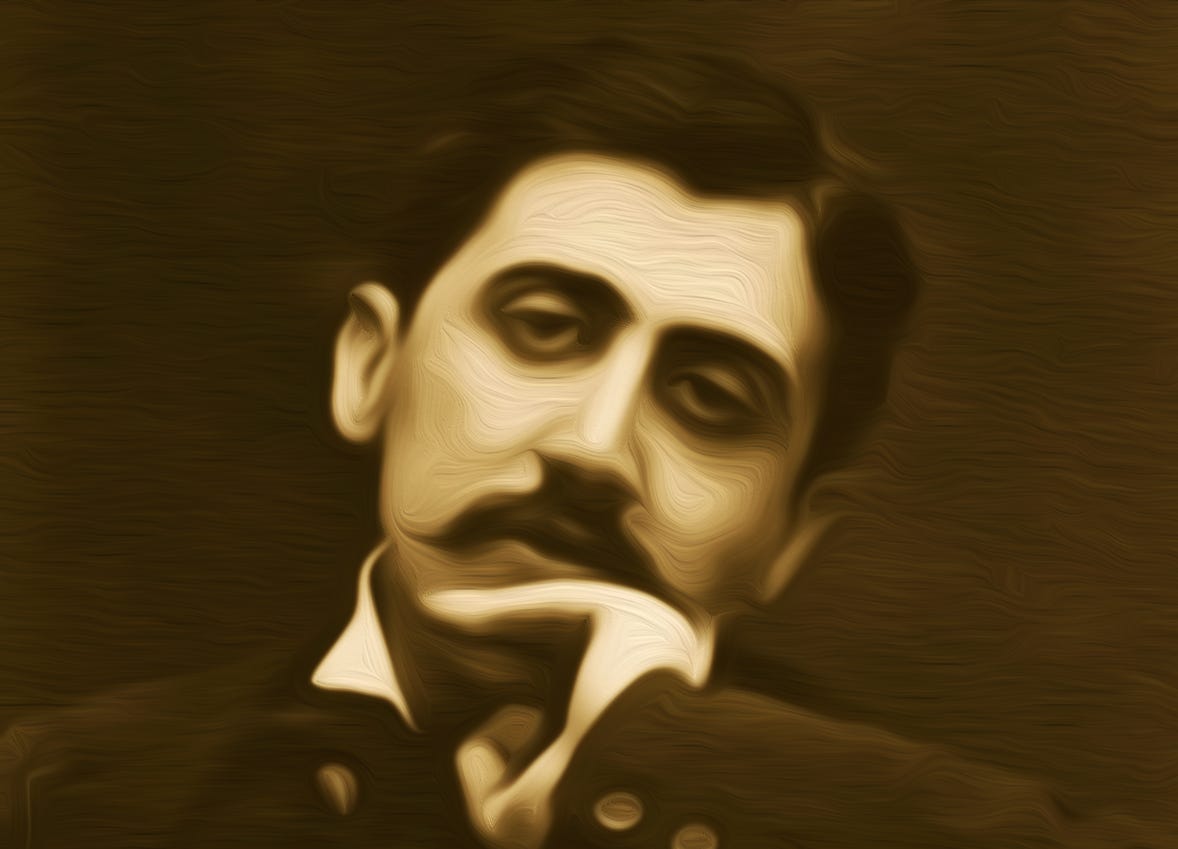7. It’s fair to say the term 'Proustian' is most often understood...
The seventh instalment of 'Oh, That More Such Flowers May Come Tomorrow' in which our hero reflects on the opening volume of the novel.
It’s fair to say the term ‘Proustian’ is most often understood in relation to the events that take place in the first volume of the novel, Swann’s Way…
I suppose that’s because many people don’t read much beyond this. It’s here that the Narrator describes the discombobulating process of falling asleep, waking, and falling asleep once again, which becomes something of a motif throughout the novel; and it’s here we learn of that essential soporific during his childhood years, a goodnight kiss from his mother. We also discover the deft delineation of the disparities that exist between the perception and reality of personality, while also meeting the characters of Charles Swann, his wife Odette, and their daughter Gilberte, who all, individually and collectively, play an important part in the Narrator’s early emotional life.
And it’s here that we follow our hero on his walks along the ‘two ways’, nominally separate trails through the countryside near the fictional village of Combray, but also symbolic paths central to the novel’s overall structure. Finally, it’s in the opening volume that we find the very first instance of what the Narrator terms ‘involuntary memory’, a remembrance of things past precipitated by his dipping of the now-famous madeleine cake in tea.
Combray is loosely based on a small town to the south-west of Paris called Illiers (which, in a case of life appropriating art, has since been renamed Illiers-Combray). For the Narrator, the village and the family home resonate with a kind of numinous energy, alive amid the dim intuitions of his febrile imagination, burgeoning aesthetic awareness, and the first stirrings of sexual awakening. The voice we hear is of an older man describing the child he once was, and yet we also seem to be listening to the boy speak from within his own time, at once distant yet distinctly present. There is a strange polyphony at work here, a curious fluidity to the narrative voice, that sets a precedent for the entire novel.
Throughout, the Narrator is never referred to by his Christian name, except on two occasions when he is playfully referred to as ‘Marcel’. It’s easy to fall into the trap of thinking this must be Proust himself and that what we’re reading is a thinly veiled biography. It isn’t that simple. And new readers should be alive to this fact. Such a transparent move would be far too crude for a writer of his genius, whose entire approach to characterisation is one of a diligent chemist mixing the innumerable substances he has scattered about his laboratory to produce the perfect compound. For Proust, character is always chimerical.
In the centre of the village stands the church of Saint-Hilaire, with a steeple ‘that dominated everything else, summoning the houses from an unexpected pinnacle, raised before me like the finger of God’. This building in particular takes on a special and sacred significance for the Narrator; a further example of how the world is invested with a strange and numinous power in which objects of clay, wood and stone appear to possess voices audible to him, a young boy who seems intuitively to understand that much-quoted line from Hamlet: ‘There are more things in heaven and earth, Horatio, than are dreamt of in your philosophy’.
Forever occupied with the overlapping of his internal and external lives, and with the liminal space between them, the Narrator drifts back and forth between conscious and unconscious life, between rationality and intuition, will and representation, much like the solitary lily he so memorably describes caught in the current of the enchanted river that runs just outside the village, ‘like a ferry-boat mechanically propelled, it would drift over to one bank only to return to the other, eternally repeating its double journey.’
Against this bucolic background the rewards of reading In Search of Lost Time soon become clear, as the reader is submerged in the world of the Narrator’s childhood and caught up in a strange admixture of comfortable melancholy and jocular domesticity, out of which something recognisable from her own life emerges. Proust’s ear for the turns of phrase around which the close-knit lives of families revolve is sublime; his astute penetration of juvenile consciousness; his ability to perfectly distil the imperceptible significances of our internal existence – it all smacks you about the face with its effortless brilliance.
After only a short while, I found that Proust’s sinuous sentences had a kind of hypnotic effect upon me, which in those early days delivered something of a respite from my troubles, temporarily lifting me off the treadmill of my own malady. But what they also produced was a curious doubling of my thoughts, like two tracks running parallel to one another – on one side the story of the Narrator’s early life, on the other the slowly fomenting story of my own, suddenly more concrete than it had been for a long time, as if some kind of psychic cine-projector had sparked back into action after being left abandoned for years in a dusty cupboard.
And although there was little opulence or grandeur about my own upbringing, its return was bathed in a golden light, in which my own memories of numinous affiliation with the everyday things around me were raised up with a new, powerful and entirely unexpected clarity.
Need to catch up on previous instalments? You can find links to all the previous chapters here.




